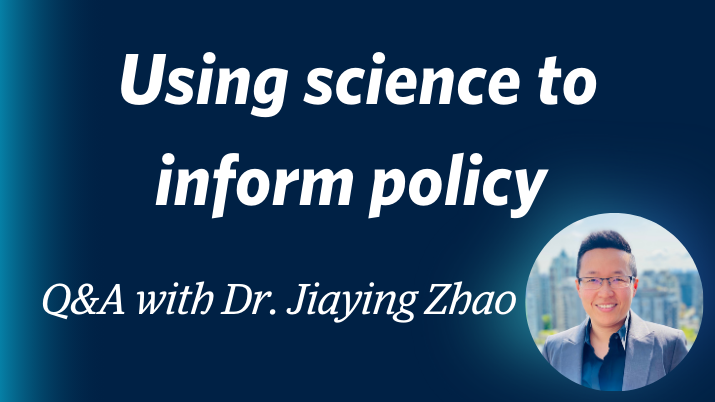

Dr. Jiaying Zhao (she/her/hers) is an Associate Professor in the Department of Psychology and the Institute for Resources, Environment and Sustainability at UBC, Canada Research Chair in Behavioural Sustainability, and UBC Sauder Distinguished Scholar. We spoke with Dr. Zhao to learn more about her work on Bill S-233, and using her research and science to inform policy in Canada.
What are you doing on Tuesday, October 17, 2023?
I’m testifying in the Canadian Senate as an expert witness on Bill S-233: a new legislation to establish a national framework for a Guaranteed Livable Basic Income. I’ll offer my professional opinion on this Bill with the scientific evidence from my work and other past studies. Tuesday is also the International Day for the Eradication of Poverty, so after the Senate hearing, I’ll also present at a news conference with Senator Kim Pate, MP Leah Gazan, Former Ontario Premier Kathleen Wynne, and Dr. Evelyn Forget. The Senate hearing will be live-streamed, and you can find its agenda as well.
How do you feel about the testimony?
I feel excited! As a scientist, my goal is to improve society in a meaningful way. This is an important moment where I can use science to improve public policy which can impact the lives of millions in Canada.
How did you get involved in working with the Senate in Ottawa?
I have been working with a number of Senators on poverty reduction initiatives in Canada. Earlier this year, I started working closely with Senator Kim Pate on Bill S-233 which she’s been leading. Since the Senate Committee on National Finance is currently studying this Bill, they invited me to testify as an expert witness.
What is Bill S-233?
Bill S-233 is an Act to develop a national framework for a guaranteed livable basic income in Canada. This Act requires the Minister of Finance to develop a national framework to provide all persons over the age of 17 in Canada with access to a guaranteed livable basic income, including temporary workers, permanent residents, and refugee claimants.
What does this Bill mean for Canadians?
This Bill, if passed in the Senate and the House (the equivalent Bill C-233), will effectively provide income security to millions of people in Canada and raise the income floor for marginalized individuals who are struggling to survive. It will revolutionize the current social assistance system to be more inclusive, equitable, and effective.
What would this Bill mean for the UBC Psychology community?
One struggle we face in the UBC Psychology community is that many of our students are experiencing considerable financial stress, given the rising living costs but the stagnant fellowship rates. This Bill will help our students tremendously by giving them a livable basic income.
How does this Bill relate to your research?
My previous work shows that poverty consumes cognitive resources, forcing people to focus on urgent financial matters while neglecting other important things. A basic income can help alleviate the cognitive tax of poverty in low-income individuals, improving their well-being and productivity. My current work shows that cash transfers offer numerous benefits to both the recipients and society, which provides support to the Bill.
How can we learn more about the importance of cash transfers?
I have just published a co-edited book titled: ‘Cash Transfers for Inclusive Societies: A Behavioral Lens’ with Saugato Datta and Dilip Soman. The book showcases how behavioral science can better inform the design, delivery, and evaluation of cash transfer programs. Governments, practitioners, and researchers can use this book to design cash transfer programs to improve inclusivity and equality and reduce poverty.
How can we support this Bill?
You can support this Bill by telling our Senators to send S-233 to the House! Sign the petition now.


